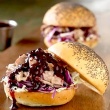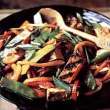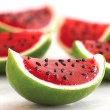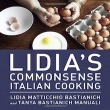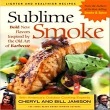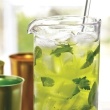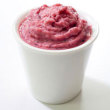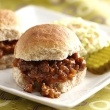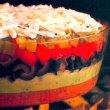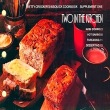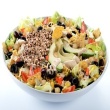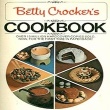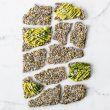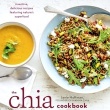Recipe: Cooking with Dry Beans or Canned Beans (including soaking methods)
Recipe CollectionsCOOKING WITH DRY BEANS OR CANNED BEANS
SOAKING DRY-PACKAGED BEANS
Before cooking, soak dry-packaged beans to help soften and return moisture to the beans and reduce cooking time. Most beans will rehydrate to triple their dry size, so be sure to start with a large enough pot.
PREFERRED HOT SOAK AND QUICK SOAK METHODS:
Hot soaking helps dissolve some of the gas-causing substances, making the beans easier to digest. For each pound beans, add 10 cups hot water; heat to boiling and let boil 2 to 3 minutes. Remove from heat, cover and set aside for at least one hour (Quick Soak), or up to 4 hours (Hot Soak).
TRADITIONAL OVERNIGHT SOAK:
For each pound (2 cups) dry-packaged beans, add 10 cups cold water and let soak overnight, or at least 8 hours.
COOKING DRY-PACKAGED BEANS:
Drain soaking water and rinse beans; cook in fresh water. In general, beans take 30 minutes to 2 hours to cook depending on variety. Check bean packaging for specific cooking times and instructions.
Spice up beans while they cook. Seasonings such as garlic, onion, oregano, parsley or thyme can be added to the pot while beans are cooking. Add acidic ingredients, such as tomatoes, vinegar, wine or citrus juices, only at end of cooking, when the beans are tender.
Add salt only after beans are cooked to tender. If added before, salt may cause bean skins to become impermeable, halting the tenderizing process.
To test for doneness, bite-taste a few beans. They should be tender, but not overcooked. When cooling, keep beans in cooking liquid to prevent them from drying out.
COOKING WITH CANNED BEANS:
Canned beans are a great convenience since they are already presoaked and precooked. Always drain and thoroughly rinse canned beans before adding
them to a recipe. It is not necessary to recook canned beans, just heat them if a recipe calls for it. Canned beans, like dry-packaged beans, absorb flavors from other ingredients in a dish because their skins are completely permeable.
BEANS AND HEALTH:
Beans are an extremely beneficial component in all diets because they are high in complex carbohydrates, protein and dietary fiber, low in fat, calories and sodium, and completely cholesterol-free. As little as a half cup of beans added to the daily diet can be very helpful in reaching important nutrition goals.
Source: American Bean Board
SOAKING DRY-PACKAGED BEANS
Before cooking, soak dry-packaged beans to help soften and return moisture to the beans and reduce cooking time. Most beans will rehydrate to triple their dry size, so be sure to start with a large enough pot.
PREFERRED HOT SOAK AND QUICK SOAK METHODS:
Hot soaking helps dissolve some of the gas-causing substances, making the beans easier to digest. For each pound beans, add 10 cups hot water; heat to boiling and let boil 2 to 3 minutes. Remove from heat, cover and set aside for at least one hour (Quick Soak), or up to 4 hours (Hot Soak).
TRADITIONAL OVERNIGHT SOAK:
For each pound (2 cups) dry-packaged beans, add 10 cups cold water and let soak overnight, or at least 8 hours.
COOKING DRY-PACKAGED BEANS:
Drain soaking water and rinse beans; cook in fresh water. In general, beans take 30 minutes to 2 hours to cook depending on variety. Check bean packaging for specific cooking times and instructions.
Spice up beans while they cook. Seasonings such as garlic, onion, oregano, parsley or thyme can be added to the pot while beans are cooking. Add acidic ingredients, such as tomatoes, vinegar, wine or citrus juices, only at end of cooking, when the beans are tender.
Add salt only after beans are cooked to tender. If added before, salt may cause bean skins to become impermeable, halting the tenderizing process.
To test for doneness, bite-taste a few beans. They should be tender, but not overcooked. When cooling, keep beans in cooking liquid to prevent them from drying out.
COOKING WITH CANNED BEANS:
Canned beans are a great convenience since they are already presoaked and precooked. Always drain and thoroughly rinse canned beans before adding
them to a recipe. It is not necessary to recook canned beans, just heat them if a recipe calls for it. Canned beans, like dry-packaged beans, absorb flavors from other ingredients in a dish because their skins are completely permeable.
BEANS AND HEALTH:
Beans are an extremely beneficial component in all diets because they are high in complex carbohydrates, protein and dietary fiber, low in fat, calories and sodium, and completely cholesterol-free. As little as a half cup of beans added to the daily diet can be very helpful in reaching important nutrition goals.
Source: American Bean Board
MsgID: 3138630
Shared by: Betsy at Recipelink.com
In reply to: Recipe: Recipes Using Beans or Lentils (19)
Board: Daily Recipe Swap at Recipelink.com
Shared by: Betsy at Recipelink.com
In reply to: Recipe: Recipes Using Beans or Lentils (19)
Board: Daily Recipe Swap at Recipelink.com
- Read Replies (19)
- Post Reply
- Post New
- Save to Recipe Box
ADVERTISEMENT
UPLOAD AN IMAGE
Allowed file types: .gif .png .jpg .jpeg
Allowed file types: .gif .png .jpg .jpeg
POST A REPLY
Post a Request - Answer a Question
Share a Recipe
Thank You To All Who Contribute
Post a Request - Answer a Question
Share a Recipe
Thank You To All Who Contribute
POST A NEW MESSAGE
Post a Request - Answer a Question
Share a Recipe
Thank You To All Who Contribute
Post a Request - Answer a Question
Share a Recipe
Thank You To All Who Contribute












